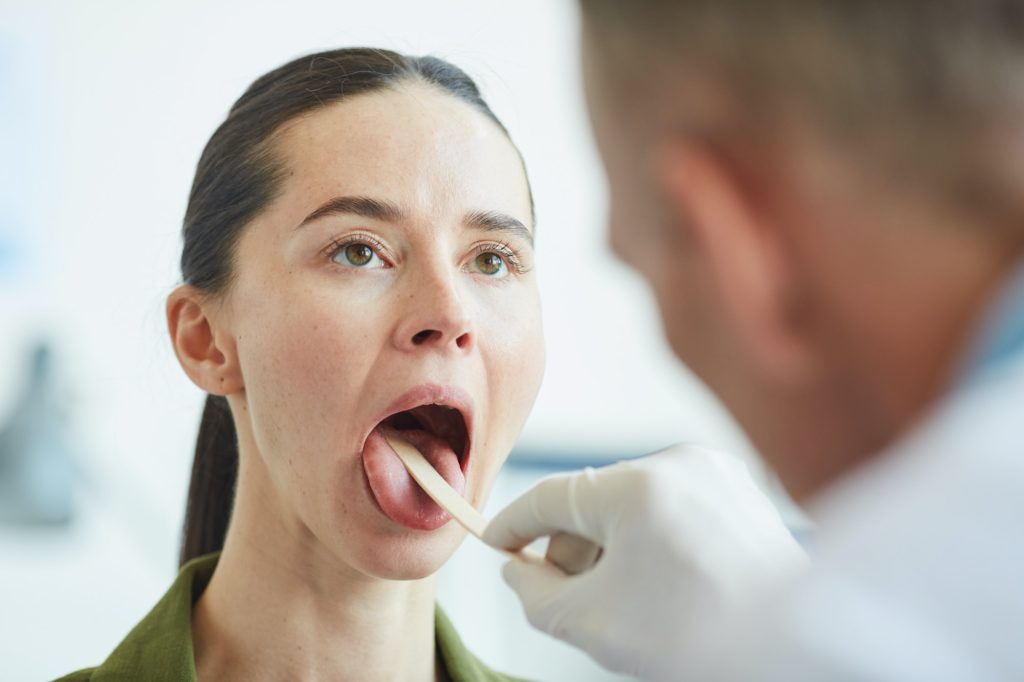What is Oral Thrush?

Discover everything you need to know about oral thrush, from what it actually is, to how to treat or prevent oral thrush from happening in the first place.
Table of Contents
Don’t get freaked out, but everyone has a small amount of fungus living in their mouth. This is perfectly normal, but if the fungus rapidly multiplies, it can lead to a yeast infection.
What is Oral Thrush?
Oral thrush is when a yeast infection develops inside your mouth. It is more likely to happen in toddlers. You’ll notice white or yellowish lesions that are on the inside of your cheeks, gums, lips, tongue, and on the roof of the mouth. Luckily for people experiencing oral thrush, the infection is pretty mild, and these spots go away with proper treatment, and it is very unlikely to cause serious problems. If left untreated, it can spread to other parts of the body and potentially cause serious problems.
What are the Symptoms of Oral Thrush?
In the beginning, you may not notice any symptoms, but as the infection gets worse, the following symptoms may develop.
- white or yellow spots that develop on your inner cheeks, gums, tongue, tonsils, or lips
- soreness in your mouth
- a fuzzy sensation in your mouth
- dry skin on the corners of your mouth
- trouble swallowing
- a bad taste or smell in your mouth
- slight bleeding
- loss of taste
What are the Treatments of Oral Thrush?
Treatment for oral thrush is rather simple. No procedure is needed since, most of the time, a simple prescription can help treat everything going on. Once you start treatment, oral thrush usually will go away in a couple of weeks. Your dentist will likely prescribe one or more of these medications:
- nystatin (Nystop, Nyata), a mouthwash for antifungal purposes
- itraconazole (Sporanox), an oral antifungal medication
- fluconazole (Diflucan), an oral antifungal medication
- clotrimazole (Mycelex Troche), an antifungal medication that’s available as a lozenge
- amphotericin B (AmBisome, Fungizone), used for more severe cases of oral thrush
How to Prevent Future Oral Thrush?
Even though oral thrush is unlikely to cause any serious harm, it’s essential to get it treated right away so it can’t spread and cause further complications. Practicing good oral hygiene will prevent any fungus in your mouth from multiplying to uncontrollable levels. Make sure to brush twice daily and floss. Don’t share cups or utensils with others, and try to limit food with high sugar content. If you have any concerns, see your dentist, as they can help figure out a solution that’s perfect for you.
Oral Thrush FAQs
Oral thrush, or oral candidiasis, is caused by an overgrowth of the Candida fungus in the mouth. Candida is naturally present in the mouth in small amounts but can multiply and lead to an infection under certain conditions. Common causes include a weakened immune system, such as in individuals with HIV/AIDS or undergoing cancer treatment, prolonged use of antibiotics or corticosteroids, poorly fitting dentures or dental appliances that irritate, and certain medical conditions like diabetes or dry mouth.
Additionally, individuals with a weakened immune system, infants, and older adults are more susceptible to developing oral thrush. Treatment typically involves antifungal medications such as oral rinses or lozenges to kill the Candida fungus and reduce symptoms.
The duration of oral thrush can vary depending on several factors, including the individual’s overall health, the infection’s severity, and the treatment’s effectiveness. With appropriate treatment, it can often resolve within 1 to 2 weeks. However, it’s important to note that the underlying cause of the infection should also be addressed to prevent recurrence. If the individual’s immune system is compromised or the infection is severe, it may take longer to clear the thrush fully.
It is crucial to follow the prescribed treatment plan, complete the entire course of medications, and maintain good oral hygiene practices to promote healing and prevent the infection from returning. Consulting with a healthcare professional is recommended for a proper diagnosis and treatment guidance for oral thrush.
Several risk factors can increase the likelihood of developing oral thrush. These include having a weakened immune system due to HIV/AIDS, cancer treatment, or certain autoimmune disorders. Individuals with uncontrolled diabetes or dry mouth are also at higher risk. Other factors include prolonged use of antibiotics or corticosteroids, which can disrupt the natural balance of microorganisms in the mouth, creating an environment conducive to fungal overgrowth.
Poor oral hygiene, smoking, wearing ill-fitting dentures or dental appliances that irritate, and undergoing specific medical procedures like chemotherapy or radiation therapy can also increase the risk. Understanding these risk factors can help individuals take preventive measures and seek appropriate treatment.
Oral thrush is typically diagnosed through clinical examination and laboratory tests. A healthcare professional will examine the mouth and look for characteristic signs of the infection, such as white patches on the tongue, inner cheeks, or other oral tissues that cannot be easily scraped off. In some cases, a sample of the affected area may be taken for further analysis. This can involve swabbing the oral lesions and sending the sample to a laboratory for microscopic examination or culturing to identify the presence of Candida fungus.
Additionally, if the underlying cause is suspected to be related to an immune system disorder or other medical conditions, further tests or consultations may be necessary to determine the underlying cause. It is important to consult with a healthcare professional for an accurate diagnosis and appropriate treatment plan.
